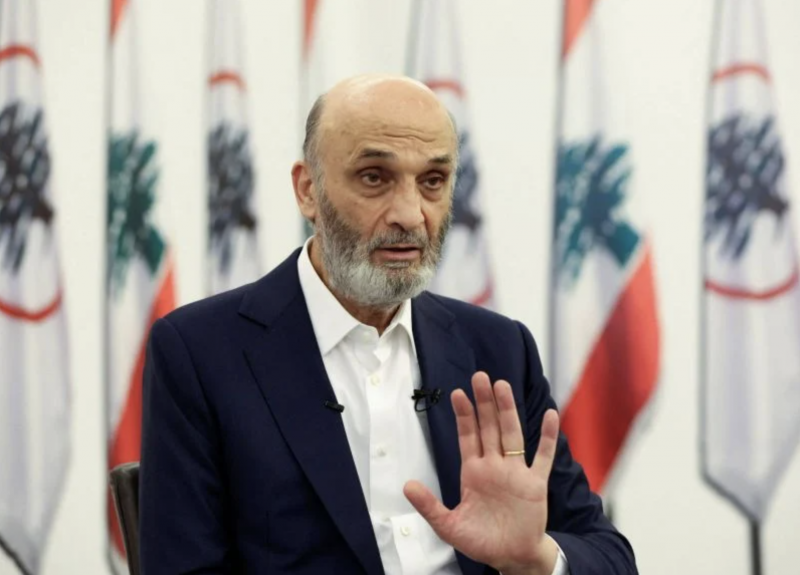
Little by little, the euphoria is fading. On the evening of May 15, when the first results of the legislative elections began to come in, Lebanese Forces leader Samir Geagea had a reason to be jubilant.
Everything indicated that he won the bet to become the main force of the Christian political scene, the first opponent of Hezbollah and the leader of the opposition, after having participated in the presidential compromise that saw Michel Aoun ascending the presidency back in 2016.
On the evening of May 15, the LF thought they had won more than 20 seats, with the most optimistic estimates giving them 23.
The next day, the final picture was less glorious: 19 seats, while the party’s candidate in Bcharre, the LF fiefdom, lost.
While the gap with the Free Patriotic Movement (18 seats) was smaller than expected, this did not stop Geagea from declaring that “Christian public opinion has changed sides.”
He claimed victory and set out his conditions for future elections. In theory, the LF are the big winners and Hezbollah has lost its majority.
But the reality of the vote is one thing, politics is another. The LF realized this during the first Parliament session to elect the speaker and deputy speaker.
Geagea had announced that his party would not vote for Nabih Berri, the only candidate for the speakership, and that it would propose a candidate for the post of deputy speaker.
He thought he could win this battle with the help of the opposition and independent MPs. But nothing went as planned.
During the session, the LF took a slap in the face.
Berri was elected in the first round, and Elias Bou Saab, the FPM candidate, was elected as deputy speaker in the second round against the independent Ghassan Skaff.
In both cases, Hezbollah was able to gather a majority, unlike the LF, which was quite isolated.
Even worse, their candidate for Parliament Bureau’s Secretary Ziad Hawat received only 38 votes, less than a third of the Parliament.
“Geagea has been unable to convince the independents and MPs representing the thawra (revolution). He shows no political flexibility and wants to impose his views on everyone,” a March 14 heavyweight told L’Orient-Le Jour on condition of anonymity.
The LF leader is not known for his ability to smooth things over. He tends to manage his allies, especially Christian ones, like his party: he has the power, the others must follow.
This policy contributes even more to isolating him today as he has no solid allies in Parliament.
The MPs representing the protest movement are suspicious of him and do not consider him as one of their own.
The Kataeb do not miss an opportunity to differentiate themselves from the LF.
The Christian independents, close to Geagea’s political line, like Michel Moawad, Fares Souhaid or Majd Harb, reproach him for having wanted to eliminate them politically.
“Geagea always wants to win for himself, and only for himself. He could have inflicted a much heavier defeat on Hezbollah if he were less narrow-minded, but he doesn’t think like that,” commented a pro-March 14 Christian leader who requested anonymity.
‘Stronger with eight MPs than with 19’
Relations with Walid Joumblatt’s Progressive Socialist Party are strained and cannot be considered as strategic.
Relations with the Sunnis have been in shambles since the dispute between the LF and the Future Movement after former Prime Minister Saad Hariri withdrew from politics.
However, independent Sunni MPs and ex-Hariri MPs are currently the key to the majority.
“The LF was stronger in Parliament with eight MPs than with 19,” said an old baron of Lebanese politics.
Since 2019, Geagea has staked everything on the elections. He sensed, during the Oct. 17 uprising in which his supporters largely participated, that the Christian community was changing sides.
A master tactician, he knows how to read electoral realities well and knew for months before the elections that he would get about 20 MPs.
But now, what to do with this victory?
Will he continue to stay out of the political game, as he has done since 2019? What will be his objective now that the elections are over?
“We are accelerating contacts with the PSP, independent MPs and MPs of the protest movement,” said a close associate to Geagea who also requested anonymity.
The LF does not want to repeat the same scenario of the deputy speaker, and assures that the coordination will be much stronger.
The Christian party has repeatedly said that it will not participate in a government of national unity and that it wants to form majority cabinets.
“If it is a government that includes everyone, as usual, of course we will not participate,” Geagea told Reuters last week, saying that the fragmentation of Parliament could lead to a “major confrontation” with Hezbollah.
But this requires the LF to reach an agreement with all the forces not allied with Hezbollah in order to obtain a majority behind a candidate for prime minister.
This will not be an easy feat. And assuming they succeed, how can Aoun be convinced to approve a government in which his party and its main ally are not represented?
The president’s endorsement, however, is essential.
This is why the LF, like their Saudi sponsor, are already looking ahead to the next step: the presidential elections.
Regarding this juncture, Geagea already set the tone: “This time, the LF will oppose the election of a candidate supported by Hezbollah.”
This article was originally published in French on L'Orient-Le Jour. Translation by Sahar Ghoussoub.